Related Research Articles
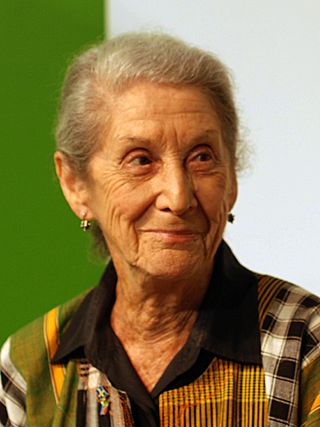
Nadine Gordimer was a South African writer and political activist. She received the Nobel Prize in Literature in 1991, recognised as a writer "who through her magnificent epic writing has ... been of very great benefit to humanity".
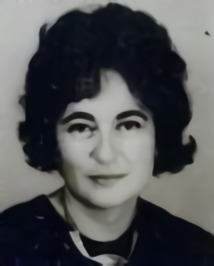
Heloise Ruth First OLG was a South African anti-apartheid activist and scholar. She was assassinated in Mozambique, where she was working in exile, by a parcel bomb built by South African police.

Helen Beatrice Joseph OMSG was a South African anti-apartheid activist. Born in Sussex, England, Helen graduated with a degree in English from the University of London in 1927 and then departed for India, where she taught for three years at Mahbubia School for girls in Hyderabad. In about 1930 she left India for England via South Africa. However, she settled in Durban, where she met and married a dentist, Billie Joseph, whom she later divorced.
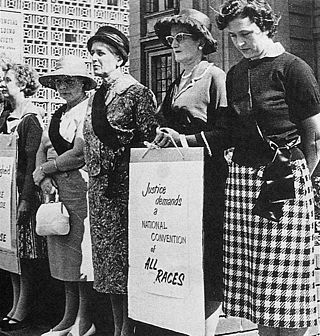
The Black Sash is a South African human rights organisation. It was founded in Johannesburg in 1955 as a non-violent resistance organisation for liberal white women.
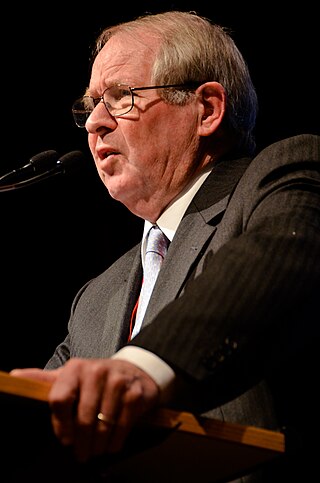
Christopher John Robert Dugard is a South African professor of international law. His main academic specializations are in Roman-Dutch law, public international law, jurisprudence, human rights, criminal procedure and international criminal law. He has served on the International Law Commission, the primary UN institution for the development of international law, and has been active in reporting on human-rights violations by Israel in the Palestinian territories.
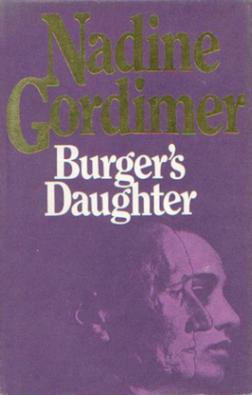
Burger's Daughter is a political and historical novel by the South African Nobel Prize in Literature-winner Nadine Gordimer, first published in the United Kingdom in June 1979 by Jonathan Cape. The book was expected to be banned in South Africa, and a month after publication in London the import and sale of the book in South Africa was prohibited by the Publications Control Board. Three months later, the Publications Appeal Board overturned the banning and the restrictions were lifted.
Sheena Duncan was a South African anti-Apartheid activist and counselor. Duncan was the daughter of Jean Sinclair, one of the co-founders of the Black Sash, a group of white, middle-class South African women who offered support to black South Africans and advocated the non-violent abolishment of the Apartheid system. Duncan served two terms as the leader of Black Sash.
The International Defence and Aid Fund or IDAF was a fund created by John Collins during the 1956 Treason Trial in South Africa. After learning of those accused of treason for protesting against apartheid, including Nelson Mandela, Collins created the fund in order to pay all legal expenses and look after the families of those on trial. The group was non-partisan.

Gille de Vlieg is a photographer and anti-apartheid activist. She was born in England and moved to South Africa with her mother when she was 3 years old. During apartheid she was a member of both the Black Sash and one of the few women members of the Afrapix photography collective. Her images have been published in newspapers, magazines and books nationally and internationally. Unlike many of her counterparts, de Vlieg received little public acclaim for her work up until recently. About her work, she says, "I wanted to make a contribution to an alternative view of South Africa, a view not seen on the South African TV screen then." Her images cover the following topics: land removals, rural lifestyle, township lifestyle, gender lifestyle, United Democratic Front (UDF), anti-harassment campaign, police violence, protests against death penalty, funerals, Black Sash, protests against incorporation into Bophuthatswana; Release Mandela Campaign, End Conscription Campaign (ECC), conscientious objectors, African National Congress (ANC) Welcome Home Rally, Day of the Vow (Geloftedag), street children, and homeless people.

What Happened to Burger's Daughter or How South African Censorship Works is a 1980 collection of essays by South African novelist Nadine Gordimer and others. The book is about the South African government's banning and subsequent unbanning of Gordimer's 1979 novel Burger's Daughter.
Felicia, Lady Kentridge was a South African lawyer and anti-apartheid activist who co-founded the South African Legal Resources Centre (LRC) in 1979. The LRC represented black South Africans against the apartheid state and overturned numerous discriminatory laws; Kentridge was involved in some of the Centre's landmark legal cases. Kentridge and her husband, the prominent lawyer Sydney Kentridge, remained involved with the LRC after the end of apartheid, though they moved permanently to England in the 1980s. In her later years, Kentridge took up painting, and her son William Kentridge became a famous artist.
Shulamith Muller was a South African lawyer, communist, and anti-apartheid activist. Muller was one of the attorneys for the 1956 Treason Trial.
Ethel de Keyser OBE OLG was a South African anti-apartheid activist based in London, England.
Hugh Lewin was a South African anti-apartheid activist and writer. He was imprisoned from 1964 to 1971 for his activities in support of the African Resistance Movement, and then spent 20 years in exile, returning to South Africa in 1992. An account of his experience, Bandiet, won the Olive Schreiner Prize in 2003.
Wendy Heather Woods was a South African educator and anti-apartheid activist. Woods worked with her husband, journalist Donald Woods, on anti-apartheid activities and both fled into exile to the United Kingdom in 1977. Woods herself was an active member of the Black Sash. In exile, Woods worked with various charities and after her husband's death, set up the Donald Woods Foundation. She and her family are featured in the 1987 movie Cry Freedom.
Ruth Noël Robb was a South African activist and member of the Black Sash.
Adelaine "Ad" Florence Hain was a South African anti-apartheid activist. She was a member of the South African Liberal Party and was active in Pretoria. After she and her family left South Africa, she continued to agitate in London. Hain is the mother of British politician Peter Hain, and she worked for him part-time until she was 82.
Max Coleman was a South African activist and former businessman. He represented the African National Congress (ANC) in the National Assembly from 1994 to 1995 and then served in the South African Human Rights Commission from 1995 to 1996. During apartheid, Coleman was a founding member of the Detainees' Parents' Support Committee, a civil society organisation, after his son was detained for his political activities. Coleman subsequently sold his business in order to organise on the committee's behalf full time.
Jeanette Eva Schoon was a South African anti-apartheid activist. She and her daughter, Katryn Schoon, were killed by letter bomb in June 1984 in an operation carried out by the Security Branch of the South African Police.
References
- Raymond Tucker, Dugard, J., SAJHR 20, 2004